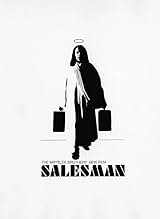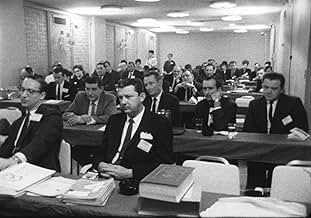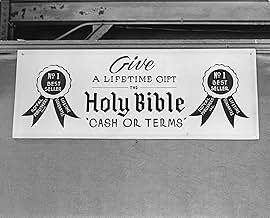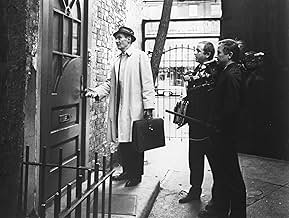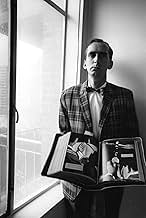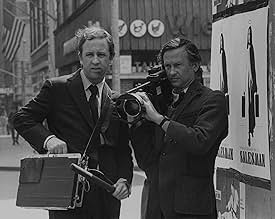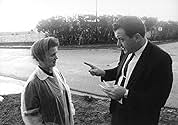IMDb RATING
7.6/10
6.1K
YOUR RATING
Four dogged door-to-door Bible salesmen travel from Boston to Florida on a seemingly futile quest to sell luxury editions of the Good Book to working-class Catholics.Four dogged door-to-door Bible salesmen travel from Boston to Florida on a seemingly futile quest to sell luxury editions of the Good Book to working-class Catholics.Four dogged door-to-door Bible salesmen travel from Boston to Florida on a seemingly futile quest to sell luxury editions of the Good Book to working-class Catholics.
- Awards
- 4 wins total
7.66K
1
2
3
4
5
6
7
8
9
10
Featured reviews
Essential
"Salesman" isn't quite the Maysles Bros.' (and Charlotte Zwerin's) crowning achievement, although it comes close. I personally feel that "Gimme Shelter" is their best film, but that might have something to do with it being a more enjoyable, if still harrowing film. "Salesman" is an uncomfortable examination of human emotions, and provokes a strong reaction of guilt and sympathy. Some may insist that a documentary has to be somewhat relevant to have any real value, but "Salesman", a film on the lives of door-to-door salesmen, the product of a mostly by-gone era, is pure contradiction of this claim.
A landmark 'cinema verite' film, "Salesman" does not feature any sort of narration or writing, allowing the viewer to take the images presented in the film and interpret them as they wish. There are statements that the Maysles Bros. are probably trying to make with this film, statements about suburbia, statements about the ties between business and organized religion, and more, but the beauty of the film is that it is up to you if you see this in the film or not, because really it is simply a document of an average day for a salesman at the time.
"Salesman" is funny in parts, but taken as a whole it is one of the saddest films you will ever see, a document of the quiet desperation of this lifestyle. The directors of the film make powerful statements, but do so subtly, almost unobtrusively, allowing the viewer to fully engage themselves in the almost routine feel of the film. It is a crime that, despite its strong reputation, relatively few people have seen this essential film from possibly the very best documentary filmmakers there have ever been.
10/10
A landmark 'cinema verite' film, "Salesman" does not feature any sort of narration or writing, allowing the viewer to take the images presented in the film and interpret them as they wish. There are statements that the Maysles Bros. are probably trying to make with this film, statements about suburbia, statements about the ties between business and organized religion, and more, but the beauty of the film is that it is up to you if you see this in the film or not, because really it is simply a document of an average day for a salesman at the time.
"Salesman" is funny in parts, but taken as a whole it is one of the saddest films you will ever see, a document of the quiet desperation of this lifestyle. The directors of the film make powerful statements, but do so subtly, almost unobtrusively, allowing the viewer to fully engage themselves in the almost routine feel of the film. It is a crime that, despite its strong reputation, relatively few people have seen this essential film from possibly the very best documentary filmmakers there have ever been.
10/10
Quiet desperation more relative to many occupations than we'd care to admit.
'Salesman" is a stark reminder of the evolution of the modern documentary. As a viewer I did not feel manipulated by the editing or the filmmaker's ego or perspective. The film is a historical recording of an occupation from a by gone era that promised all the perks of the American Dream while leaving many that chose it for their career living lives of quiet desperation, poor and void of any significant contribution to society.
One of the thoughts this film left me with was how many occupations in twenty-first century America are sales dependent. Selling oneself, an idea, candidate, lifestyle, fill in the blank for an alternative to "bible." Pounding the proverbial pavement to pay the mortgage with little regard to the negative impact ones profession may have on society or nameless, faceless individuals. In today's world fortunes are made as life coaches, motivational speakers, politics, infomercials, winning American Idol, all variations of selling something to a consumer society that can ill afford the debt.
"Salesman" is a timeless film and a brilliant reminder of the origins of the documentary.
One of the thoughts this film left me with was how many occupations in twenty-first century America are sales dependent. Selling oneself, an idea, candidate, lifestyle, fill in the blank for an alternative to "bible." Pounding the proverbial pavement to pay the mortgage with little regard to the negative impact ones profession may have on society or nameless, faceless individuals. In today's world fortunes are made as life coaches, motivational speakers, politics, infomercials, winning American Idol, all variations of selling something to a consumer society that can ill afford the debt.
"Salesman" is a timeless film and a brilliant reminder of the origins of the documentary.
Fascinating
The camera follows four Bible salesmen as they follow up on names of Catholic parishioners in Boston and then Florida.
I can understand that the documentary is not for all tastes. There's really no narrative, while we know next to nothing about the four principals. Yet, the results, to me at least, are fascinating, if not entertaining. The four Bible salesmen are a harried crew, near the bottom of a commercial food chain. Pressure to sell goes from ownership to management to salesmen, and finally to prospective customers to buy. And throughout, the camera never wavers, at times lingering over a face in rather enigmatic fashion. Nor do the subjects ever acknowledge camera's presence-- quite a cinematic accomplishment. Importantly, these are ordinary faces, certainly not the Hollywood variety.
To me, the most interesting part are the working class customers. They can barely pay the bills they already have, let alone fork over an extra dollar a week. I'm guessing Badger's burnout comes from years of hustling people who should not be hustled. Of course, the pitch revolves around having a Bible with illustrations that will confirm a Catholic's faith and enrich their lives. I'm supposing the salesmen have to believe that at some level, otherwise how could they continue to pressure poor people to buy. And catch the ride by the ritzy Miami Beach hotels, right before the guys start knocking on wear-worn doors.
Overall, this is quite a remarkable 85-minutes, like nothing else I've seen. I'm not sure what to make of the result, that is, whether there's an intended point beyond the momentary. But either way, the unvarnished glimpses the film provides are definitely memorable.
I can understand that the documentary is not for all tastes. There's really no narrative, while we know next to nothing about the four principals. Yet, the results, to me at least, are fascinating, if not entertaining. The four Bible salesmen are a harried crew, near the bottom of a commercial food chain. Pressure to sell goes from ownership to management to salesmen, and finally to prospective customers to buy. And throughout, the camera never wavers, at times lingering over a face in rather enigmatic fashion. Nor do the subjects ever acknowledge camera's presence-- quite a cinematic accomplishment. Importantly, these are ordinary faces, certainly not the Hollywood variety.
To me, the most interesting part are the working class customers. They can barely pay the bills they already have, let alone fork over an extra dollar a week. I'm guessing Badger's burnout comes from years of hustling people who should not be hustled. Of course, the pitch revolves around having a Bible with illustrations that will confirm a Catholic's faith and enrich their lives. I'm supposing the salesmen have to believe that at some level, otherwise how could they continue to pressure poor people to buy. And catch the ride by the ritzy Miami Beach hotels, right before the guys start knocking on wear-worn doors.
Overall, this is quite a remarkable 85-minutes, like nothing else I've seen. I'm not sure what to make of the result, that is, whether there's an intended point beyond the momentary. But either way, the unvarnished glimpses the film provides are definitely memorable.
Could have been more then but the cold look at the sales business, the sellers and the potential buyers is well done and makes for engaging if rather downbeat entertainment
Paul Brennan is "The Badger". Charles McDevitt is "The Gipper". James Baker is "The Rabbit" and Raymond Martos is "The Bull". However this is not yet another British gangster film from Guy Ritchie but rather a fly-on-the-wall documentary following these four door-to-door bible salesman as they go about their trade and shoot the breeze with one another. Selling for as much as $40 per ornate book, the target audience are mostly poor catholic families who are given a hard sell before being offered a range of payment methods. In the middle of a sales slum, we follow Paul Brennan as he tries to break his losing streak.
Probably the worst job I have done wasn't that bad but was when I was a cleaner 7 mornings a week while also going through university. It felt worse because I also worked weekend evenings in a bar. However I would happily do either of those again if the only other option open to me was telephone or door-to-door sales because to me it is a soul-destroying job. I know some people can excel at it but others scrape by on their commissions, trying to force products onto others that they wouldn't buy themselves. This documentary confirms my thoughts on the job as we follow Paul Brennan on sales calls, conferences and sales meetings. Those familiar with Glengary Glenross will know where they are already and personally I kept seeing Brennan as the Gill character from the Simpsons, frantically just trying to get by. The film doesn't provide much more insight than that because it is very much a fly-on-the-wall affair that lets the characters speak for themselves.
By doing this it lays bare the approach of the sales game. It is depressing for several reasons and it made me feel sympathy for Brennan as often as I felt repulsed by him. He doesn't care about those he is selling to and he lies, applies pressure and guilts his marks into buying something they don't need and often don't actually want. But it is easy to feel for him because he is doing a job. I have never had someone coming door-to-door astonish me with a service or product that I suddenly wanted, especially nowadays, if you want it and can afford it, you probably already have it, but the sales staff still need to sell and Brennan's way is the most basic approach. The Maysles brothers wisely stay out of the way and I was quite amazed at how unobtrusive their camera was even when the sales were in relatively confined rooms.
Overall this is a rather depressing film that could have had more in the way of insight but does well to stand back and just observe. Modern documentaries often lose that so in a way it was refreshing not to have talking heads throughout the footage. Could have been more then but the cold look at the sales business, the sellers and the potential buyers is well done and makes for engaging if rather downbeat entertainment.
Probably the worst job I have done wasn't that bad but was when I was a cleaner 7 mornings a week while also going through university. It felt worse because I also worked weekend evenings in a bar. However I would happily do either of those again if the only other option open to me was telephone or door-to-door sales because to me it is a soul-destroying job. I know some people can excel at it but others scrape by on their commissions, trying to force products onto others that they wouldn't buy themselves. This documentary confirms my thoughts on the job as we follow Paul Brennan on sales calls, conferences and sales meetings. Those familiar with Glengary Glenross will know where they are already and personally I kept seeing Brennan as the Gill character from the Simpsons, frantically just trying to get by. The film doesn't provide much more insight than that because it is very much a fly-on-the-wall affair that lets the characters speak for themselves.
By doing this it lays bare the approach of the sales game. It is depressing for several reasons and it made me feel sympathy for Brennan as often as I felt repulsed by him. He doesn't care about those he is selling to and he lies, applies pressure and guilts his marks into buying something they don't need and often don't actually want. But it is easy to feel for him because he is doing a job. I have never had someone coming door-to-door astonish me with a service or product that I suddenly wanted, especially nowadays, if you want it and can afford it, you probably already have it, but the sales staff still need to sell and Brennan's way is the most basic approach. The Maysles brothers wisely stay out of the way and I was quite amazed at how unobtrusive their camera was even when the sales were in relatively confined rooms.
Overall this is a rather depressing film that could have had more in the way of insight but does well to stand back and just observe. Modern documentaries often lose that so in a way it was refreshing not to have talking heads throughout the footage. Could have been more then but the cold look at the sales business, the sellers and the potential buyers is well done and makes for engaging if rather downbeat entertainment.
The Real Life of the Door to Door Salesman
"Salesman" documents the activities of Bible salesmen as they go on the road to sell their wares to "leads" garnered from Catholic churches. It's a tough life, especially when many prospects cannot afford the cost of these illustrated Bibles.
It is difficult not to compare this film to Mamet's "Glengarry Glen Ross". It details the hardships and humiliations of men who earn their egos through sales. Anyone who has ever sold a product door to door can relate to this film.
The transparent sales techniques. The smug sales aphorisms. The roller-coaster ride from day to day. It is all there.
It is easy to draw conclusions or morals from this documentary. The most obvious refers to the soul-sucking depression that comes from spending your life doing something you do not enjoy or believe in.
As a time capsule of life in the late 60s, the film is enjoyable. Seeing everyone smoking cigarettes nonstop, for example, is a reminder of how things have changed.
It is difficult not to compare this film to Mamet's "Glengarry Glen Ross". It details the hardships and humiliations of men who earn their egos through sales. Anyone who has ever sold a product door to door can relate to this film.
The transparent sales techniques. The smug sales aphorisms. The roller-coaster ride from day to day. It is all there.
It is easy to draw conclusions or morals from this documentary. The most obvious refers to the soul-sucking depression that comes from spending your life doing something you do not enjoy or believe in.
As a time capsule of life in the late 60s, the film is enjoyable. Seeing everyone smoking cigarettes nonstop, for example, is a reminder of how things have changed.
Did you know
- Trivia49.95 U.S. Dollars (which is what the Bibles sold by the salesmen cost in 1965-66, the time of the movie) is the equivalent of about $500 in 2025.
- ConnectionsFeatured in Camera Three: Direct Cinema: Part 1 (1969)
- How long is Salesman?Powered by Alexa
Details
- Release date
- Country of origin
- Official sites
- Language
- Also known as
- The Maysles Brothers' Salesman
- Filming locations
- Auburn, Massachusetts, USA(The Yankee Drummer Inn)
- Production company
- See more company credits at IMDbPro
Box office
- Budget
- $105,000 (estimated)
- Runtime
- 1h 31m(91 min)
- Color
- Sound mix
- Aspect ratio
- 1.37 : 1
Contribute to this page
Suggest an edit or add missing content


